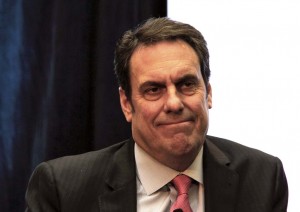The federal government bailout of General Motors spared at least 1.2 million U.S. jobs, according to a new report – and even though taxpayers will lose more than $9 billion on the rescue effort, that was more than offset by nearly $40 billion in additional taxes generated in just the year the government pulled the beleaguered automaker out of bankruptcy in 2009.
The white House has been rapidly selling off its final shares in what critics have called “Government Motors,” and expects to be completely out of the automotive business by the end of this month. The most recent Washington forecast indicated taxpayers could lose $9.7 billion on the bailout, though the rapid run-up in GM stock this past month could trim that loss, analysts note.
“Any complete cost-benefit assessment of the federal assistance to GM in its restructuring must consider the total net returns to the public investment,” declared authors Sean McAlinden and Debra Maranger Menk, in the study, “The Effect on the U.S. Economy of the Successful Restructuring of General Motors,” released today by the Ann Arbor, Michigan-based Center for Automotive Research, or CAR.
With the economy rapidly faltering amidst concerns the country could plunge into another depression, the Bush Administration used portions of the TARP program funds originally allocated to rescue the banking industry to try to stabilize the domestic auto industry. The program was expanded under newly elected Pres. Barack Obama, the government ultimately investing about $50 billion into GM and getting more than half of the company’s stock in return as the automaker emerged from bankruptcy.
(GM stock closes at all-time high, momentum continues. Click Here for more.)
The response to the controversial program has largely been divided along political lines, Republicans generally opposed, many right-wing pundits denouncing what they dubbed “Government Motors,” some even calling for a boycott of the maker’s products. In mid-2012, then-GOP candidate Mitt Romney demanded the White House sell off its stock in GM immediately, a move that, at the time, would have resulted in roughly $20 billion in losses.
Since then, the Treasury has been selling off stock at an increasingly brisk pace. The original goal was to exit GM entirely by April 2014, though the plan now calls for Washington to divest itself of the last shares by the end of December. And, with GM stock now trading well above its November 2011 IPO price, climbing above $41 a share as of midday Monday, the loss is expected to dip closer to $9 billion.
But the new CAR study contends that the government – and taxpayers – have made out far better than this might suggest, stressing that, “If the U.S. government had refused to assist,” it would have triggered “a financial crisis of unprecedented proportions.”
Instead, at least 1.2 million jobs were immediately saved in 2009, along with $39.4 billion in personal and social insurance collections in 2009 and 2010. Considering the spin-off effect on the rest of the economy, the CAR study says the actual payoff was likely closer to 2.6 million jobs and $284.4 billion in personal income preserved just between 2009 and 2010.
“There are 10s of thousands of people who can now put food on their table” as a result of the bailout, GM President Mark Reuss told TheDetroitBureau.com in response to the new study. “How can you put a price on that?”
(GM pulls Chevrolet out of Europe. Click Here for the story.)
One thing seems certain, GM will be happy to see the feds go – and to free itself of the unwanted nickname, “Government Motors.” Resentment of the bailout has, according to some studies, cost GM a number of sales, though company officials say they can’t quantify the precise amount.
There are other pluses for GM, including the ability to once again issue a common stock dividend. The maker also will get out from under a strict limit on executive pay imposed by Washington on companies that took a bailout. GM officials have said the cap has restricted its ability to attract some of the industry’s best talent.
It remains to be seen whether GM also will reward itself after the government’s exit by replenishing its fleet of corporate aircraft. The Detroit Big Three all sold off their fleets after being spanked by Congress in late 2008 during a hearing in which senior executives flew down to Washington in corporate jets before begging for financial aid to get through the recession.
(GM approaching new sales record in China. Click Here.)


It seems most people have short memories. I remember that 2008-2009 literally felt like the end of the world.
Letting GM and Chrysler go under would have been hugely disastrous, dragging down suppliers, the state of Michigan, possibly the province of Ontario, and innumerable other businesses and governments.
Was the bailout perfect? Hell no. But who can do perfect when the economy was falling apart?
I supported a bailout *** LOAN *** to keep U.S. JOBS.
Anyone who would make a deal like the Feds did with GM where GM got the money and spent it to expand their infrastruture in CHINA at the expense of U.S. jobs, should be prosecuted and held criminally responsible for fraud, dereliction of duty and collusion. The Chrysler deal wasn’t much better as tax payers got screwed on that deal also and Fiat made out like fat cats on U.S. tax payer funds. It’s a disgrace and people should go to prison over these deals.